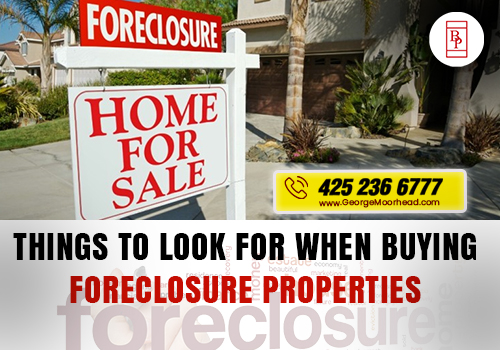Things To Look for When Buying Foreclosure Properties

Imagine finding a hidden gem in the real estate market — a property with immense potential and an irresistible price tag. While buying a foreclosure property is tempting, it's crucial to be cautious and make an informed selection. Fortunately, in today's guide, we are here to provide you with the information that will allow you to successfully traverse this process. This guide will be really useful, and, dare I say, the only one you need to read to know everything you need to know about the process, whether you're a first-time buyer looking for homes for sale in Education Hill or someone who has already dipped their toes in the real estate market.
What are Foreclosure Properties?
Imagine a house in a neighborhood where dreams were once nourished and memories were made. Now imagine that the same house is quiet and empty because the people who lived there had trouble paying their bills. Foreclosure houses are what people call these homes. But what exactly does the term means?
Since the previous owner couldn't pay the debt, the lender, which is usually a bank, now owns the property. The owner can no longer take care of the property because they are having trouble paying their bills.
Most of the time, these homes for sale have a special appeal for people looking to buy because they may be much cheaper than other listings. But it's important to be careful and think things through before buying a home in foreclosure. When getting into this area, you need to do a lot of study, do your homework, and keep an eye out for potential risks and rewards.
Even though the idea of buying a foreclosed home may make you think of both opportunity and challenge, with the right knowledge and help, buyers in Sammamish WA, can turn these now-neglected homes for sale into fresh, new places that are good for their investment portfolios and the communities they join.
Evaluating The Condition of the Property
When it comes to buying a foreclosure property, understanding its condition is of paramount importance. Often, these properties have experienced neglect or been vacant for a significant period, which can lead to various issues. To ensure you're making a wise investment, a comprehensive inspection is vital.
Imagine stepping into the property, armed with a critical eye and a thorough checklist.
From the roof to the foundation, every nook and cranny deserves your attention. Look out for visible signs of damage, such as water stains, cracks, or mold. Plumbing and electrical systems should also be inspected, as outdated or faulty installations can add significant expenses.
Even though a house that needs repairs may seem scary, it's important to figure out how much work needs to be done. This evaluation will help you figure out how much it will cost and decide if the property's promise is worth the investment. It's best to talk to contractors or other pros to get accurate estimates and avoid any costs you hadn't planned for.
Also, think about the property's general structure and whether there are any structural problems. A property's base is what holds it together, and fixing it can be a big job. Keep an eye out for signs of base problems, like cracks in the walls or floors that aren't level.
Assessing the Neighborhood
When it comes to a foreclosure property, the location is more than a fancy word. Not only does the neighborhood affect the living experience but also the long-term value and ROI.
Firstly, ask yourself this; does this community have well-maintained homes, amenities and good schools?
Secondly, things such as parks, shopping mall, hospitals and commute options also must be taken into consideration.
Thirdly, equally important are market trends. Look into recent sales data and analyze whether property values have been increasing or decreasing. A rising market could indicate a positive investment opportunity, while a declining one requires more careful thought process.
Finally, it is also advised to keep an eye on any future projects that can increase the appeal of the neighborhood.
Ultimately, it is crucial to keep in mind that foreclosure property goes beyond the property itself and extends to the outstanding environment itself.
Financing Options
While purchasing a foreclosure property can present an exciting opportunity, understanding the available financing options is crucial to make your investment dreams a reality. Here, we explore the various avenues you can explore to finance your foreclosure purchase, ensuring you choose the best fit for your financial circumstances.
Traditional Mortgage Loans: Seeking a conventional mortgage from a bank or financial institution is a common option for many buyers. This route typically requires a good credit score, a down payment, and a stable income. However, it may be challenging to secure financing for distressed properties due to their condition or uncertain title statuses.
FHA 203(k) Rehabilitation Loan: If the foreclosure property requires significant repairs or renovations, an FHA 203(k) loan might be suitable. This program allows you to finance both the purchase price and the cost of improvements in a single mortgage. It's a popular choice for buyers looking to rehabilitate distressed properties.
HomePath Financing: HomePath financing is a unique option offered by Fannie Mae for their foreclosure properties. With low down payment requirements and flexible mortgage terms, it can be an attractive choice for eligible buyers. However, keep in mind that these properties are limited to Fannie Mae's inventory.
Hard Money Loans: For investors or buyers with less-than-perfect credit or unique financial situations, hard money loans can provide a viable solution. These loans are typically offered by private lenders and are secured by the property itself, focusing more on the property's value than the borrower's financial standing.
Cash Purchase: If you have the means, buying a foreclosure property with cash offers several advantages. It eliminates the need for financing, streamlines the purchase process, and can give you leverage in negotiations. However, it's crucial to consider the opportunity cost of tying up a significant amount of capital in a single investment.
Determining the Property's Value and Making A Decision
One of the most important things to do when looking at foreclosed homes is to figure out how much they are really worth. Even though the price may be tempting, it's important to figure out how much the property is worth based on a number of factors. When you compare the prices of similar homes in the area, you can learn a lot about what the market value is. Getting help from real estate agents and evaluators can also give you a good estimate that takes into account any costs for repairs or renovations.
But figuring out a value isn't just about numbers. Think about how nice the neighborhood is and how much it could grow.
Is it in proximity to amenities, schools, and transportation?
Is there a positive trend in property values in the area?
All, these aspects contribute to a home's long term value and should not be overlooked. Your cash situation and investment goals are also important things to think about. Check to see if the property fits with what you want to do in the long run. Are you looking for a way to make money through renting or a property that could be sold again?
Ending Remarks
Navigating the realm of foreclosure properties requires a careful balance of financial acumen and strategic decision-making. By considering factors such as property condition, market value, neighborhood dynamics, and personal goals, you can position yourself for a successful investment. Thorough research, inspections, and professional guidance are essential in making an informed decision. Remember, while the path may present challenges, it also holds great potential for substantial savings and profitable opportunities.
So, armed with knowledge and a clear understanding of your objectives, venture forth confidently into the realm of foreclosure properties, and unlock the doors to your real estate aspirations.
